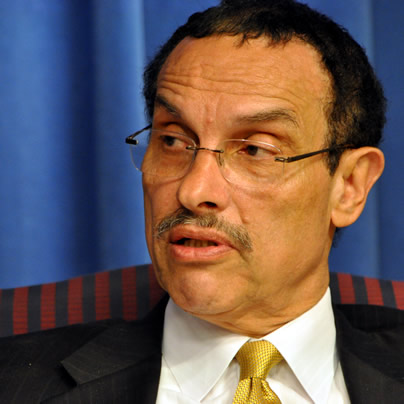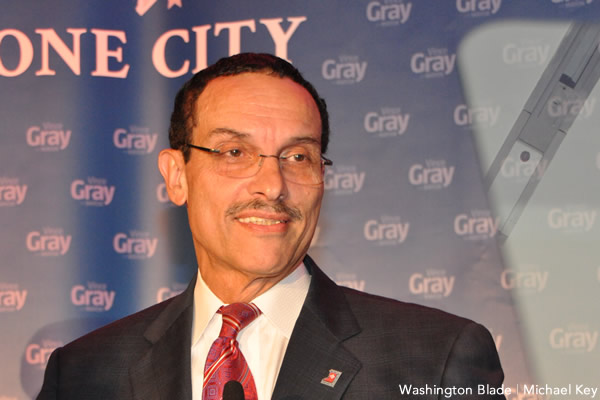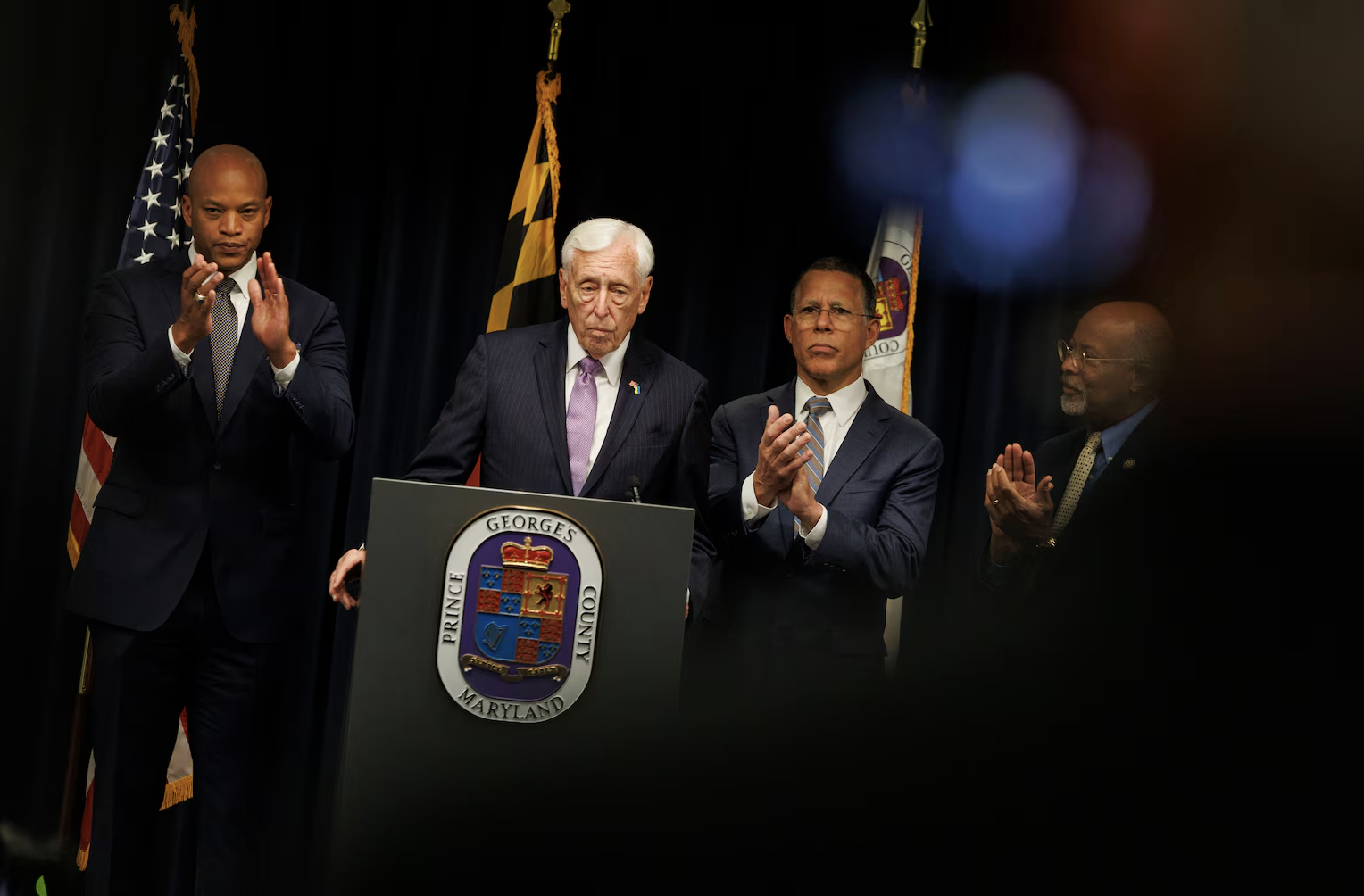Local
AIDS groups coping as contractor stops paying Medicaid claims
Mayor taking steps to restore payments for patients


‘In light of the financial problems of Chartered, I will be taking steps to protect the District’s health care provider network,’ said Mayor Vincent Gray in a statement. (Washington Blade photo by Michael Key)
Whitman-Walker Health and several other D.C. health care organizations say they are continuing to provide services to Medicaid clients with HIV/AIDS following the announcement in April that a city contractor had stopped paying Medicaid claims.
Whitman-Walker and several other local providers serving HIV/AIDS patients told the Blade they have so far managed to get by without getting paid for patients on Medicaid following the financial collapse of a city contractor that has operated D.C.’s Medicaid program.
A Washington Post story on Sunday reported that many small health care providers, including doctors’ offices and small clinics serving low-income clients, were struggling to keep their doors open since the Medicaid payments stopped last month.
The Medicaid problem began earlier this year when Chartered Health Plan, the company that arranged for Medicaid payments to doctors, hospitals, and other health care providers entered into voluntary receivership after encountering severe financial problems.
Under its contract with the city, Chartered managed Medicaid related issues for more than 100,000 low-income D.C. residents, according to a statement released in April by the D.C. Department of Health Care Finance.
The Post reported that Chartered Health Plan, once a multimillion dollar company, faced near financial collapse this year as an apparent result of revelations in late 2010 that its owner, Jeffrey E. Thompson, allegedly financed a “shadow campaign” in support of Vincent Gray’s 2010 mayoral election.
The United States Attorney’s office continues to investigate issues surrounding the campaign, which the city’s Office of Campaign Finance has said violated the city’s campaign finance law. Gray has said he had no knowledge of the so-called shadow campaign and has cooperated with investigators looking into the matter.
Whitman-Walker spokesperson Chip Lewis said Chartered owes Whitman-Walker just over $40,000 in back Medicaid payments for patient services.
“Whitman-Walker Health is absorbing the delay in payments from Chartered Health Plan within our current operations,” Lewis told the Blade. “Going forward, we do not anticipate this outstanding balance will create a major financial burden as it is a relatively small amount of funds compared to our monthly operating budget of $2.2 million.”
Ron Simmons, executive director of Us Helping Us, and Lloyd Buckner, executive director of MetroHealth, formerly known as the Carl Vogel Center, said the city’s Medicaid payment delays haven’t adversely impacted their respective organizations at this time.
Both organizations provide services for people with HIV/AIDS and both accept patients on Medicaid, the two said.
Michael Weinstein, director of the Los Angeles-based AIDS Healthcare Foundation, which operates an AIDS clinic and pharmacy in D.C., said, “Medicaid is not a big funder to our clinic” and the interruption of Medicaid payments in D.C. “is not significant to us.”
An official with La Clinica del Pueblo, a D.C. clinic that provides AIDS-related medical services for the Latino community, couldn’t immediately be reached for comment.
“In light of the financial problems of Chartered, I will be taking steps to protect the District’s health care provider network that has taken years for us to develop,” Mayor Gray said in a statement in April.
“My primary goal is to protect the stability of the community-based providers that will be at risk of closing their doors and turning away patients if there is a significant delay in being paid,” Gray said.
Gray said that he directed his Deputy Mayor for Health and Human Services, BB Otero, and the Department of Health Care Finance to develop a plan to provide relief for providers hit the hardest by the Medicaid payment cutoff.
The Post reported that since the time of the mayor’s announcement last month the city has retained a new company, AmeriHealth Caritas of Philadelphia, to replace Chartered Health as the city’s lead contractor for Medicaid services.
Virginia
Gay Va. State Sen. Ebbin resigns for role in Spanberger administration
Veteran lawmaker will step down in February

Alexandria Democrat Adam Ebbin, who has served as an openly gay member of the Virginia Legislature since 2004, announced on Jan. 7 that he is resigning from his seat in the State Senate to take a job in the administration of Gov.-Elect Abigail Spanberger.
Since 2012, Ebbin has been a member of the Virginia Senate for the 39th District representing parts of Alexandria, Arlington, and Fairfax counties. He served in the Virginia House of Delegates representing Alexandria from 2004 to 2012, becoming the state’s first out gay lawmaker.
His announcement says he submitted his resignation from his Senate position effective Feb. 18 to join the Spanberger administration as a senior adviser at the Virginia Cannabis Control Authority.
“I’m grateful to have the benefit of Senator Ebbin’s policy expertise continuing to serve the people of Virginia, and I look forward to working with him to prioritize public safety and public health,” Spanberger said in Ebbin’s announcement statement.
She was referring to the lead role Ebbin has played in the Virginia Legislature’s approval in 2020 of legislation decriminalizing marijuana and the subsequent approval in 2021of a bill legalizing recreational use and possession of marijuana for adults 21 years of age and older. But the Virginia Legislature has yet to pass legislation facilitating the retail sale of marijuana for recreational use and limits sales to purchases at licensed medical marijuana dispensaries.
“I share Governor-elect Spanberger’s goal that adults 21 and over who choose to use cannabis, and those who use it for medical treatment, have access to a well-tested, accurately labeled product, free from contamination,” Ebbin said in his statement. “2026 is the year we will move cannabis sales off the street corner and behind the age-verified counter,” he said.
Maryland
Steny Hoyer, the longest-serving House Democrat, to retire from Congress
Md. congressman served for years in party leadership

By ASSOCIATED PRESS and LISA MASCARO | Rep. Steny Hoyer of Maryland, the longest-serving Democrat in Congress and once a rival to become House speaker, will announce Thursday he is set to retire at the end of his term.
Hoyer, who served for years in party leadership and helped steer Democrats through some of their most significant legislative victories, is set to deliver a House floor speech about his decision, according to a person familiar with the situation and granted anonymity to discuss it.
“Tune in,” Hoyer said on social media. He confirmed his retirement plans in an interview with the Washington Post.
The rest of this article can be found on the Baltimore Banner’s website.
District of Columbia
Kennedy Center renaming triggers backlash
Artists who cancel shows threatened; calls for funding boycott grow

Efforts to rename the Kennedy Center to add President Trump’s name to the D.C. arts institution continue to spark backlash.
A new petition from Qommittee , a national network of drag artists and allies led by survivors of hate crimes, calls on Kennedy Center donors to suspend funding to the center until “artistic independence is restored, and to redirect support to banned or censored artists.”
“While Trump won’t back down, the donors who contribute nearly $100 million annually to the Kennedy Center can afford to take a stand,” the petition reads. “Money talks. When donors fund censorship, they don’t just harm one institution – they tell marginalized communities their stories don’t deserve to be told.”
The petition can be found here.
Meanwhile, a decision by several prominent musicians and jazz performers to cancel their shows at the recently renamed Trump-Kennedy Center in D.C. planned for Christmas Eve and New Year’s Eve has drawn the ire of the Center’s president, Richard Grenell.
Grenell, a gay supporter of President Donald Trump who served as U.S. ambassador to Germany during Trump’s first term as president, was named Kennedy Center president last year by its board of directors that had been appointed by Trump.
Last month the board voted to change the official name of the center from the John F. Kennedy Memorial Center For The Performing Arts to the Donald J. Trump And The John F. Kennedy Memorial Center For The Performing Arts. The revised name has been installed on the outside wall of the center’s building but is not official because any name change would require congressional action.
According to a report by the New York Times, Grenell informed jazz musician Chuck Redd, who cancelled a 2025 Christmas Eve concert that he has hosted at the Kennedy Center for nearly 20 years in response to the name change, that Grenell planned to arrange for the center to file a lawsuit against him for the cancellation.
“Your decision to withdraw at the last moment — explicitly in response to the Center’s recent renaming, which honors President Trump’s extraordinary efforts to save this national treasure — is classic intolerance and very costly to a non-profit arts institution,” the Times quoted Grenell as saying in a letter to Redd.
“This is your official notice that we will seek $1 million in damages from you for this political stunt,” the Times quoted Grenell’s letter as saying.
A spokesperson for the Trump-Kennedy Center did not immediately respond to an inquiry from the Washington Blade asking if the center still planned to file that lawsuit and whether it planned to file suits against some of the other musicians who recently cancelled their performances following the name change.
In a follow-up story published on Dec. 29, the New York Times reported that a prominent jazz ensemble and a New York dance company had canceled performances scheduled to take place on New Year’s Eve at the Kennedy Center.
The Times reported the jazz ensemble called The Cookers did not give a reason for the cancellation in a statement it released, but its drummer, Billy Hart, told the Times the center’s name change “evidently” played a role in the decision to cancel the performance.
Grenell released a statement on Dec. 29 calling these and other performers who cancelled their shows “far left political activists” who he said had been booked by the Kennedy Center’s previous leadership.
“Boycotting the arts to show you support the arts is a form of derangement syndrome,” the Times quoted him as saying in his statement.


















